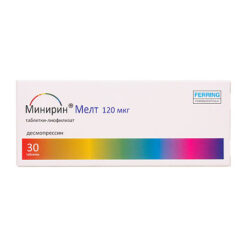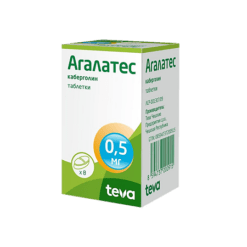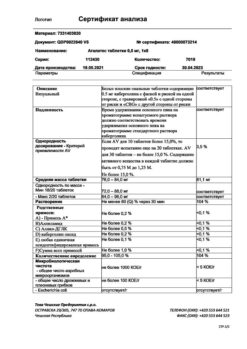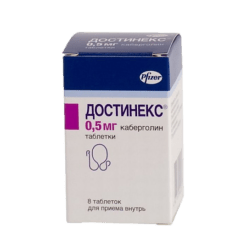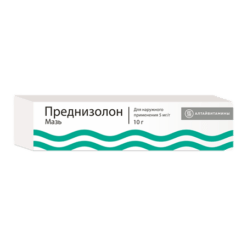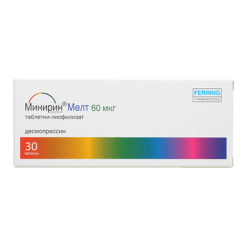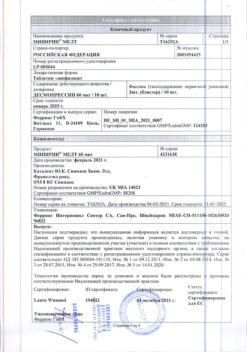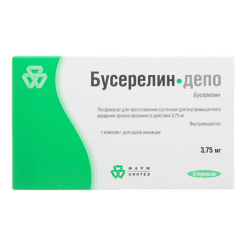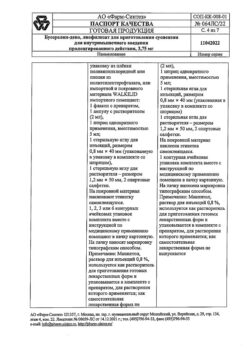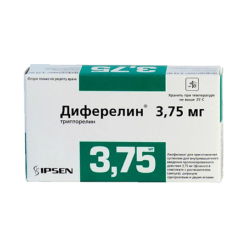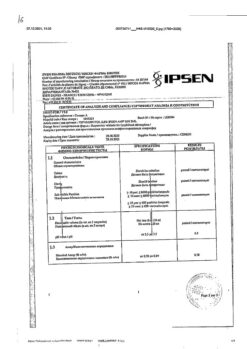No products in the cart.
Vasomirin, spray 10 mcg/dose 5 ml
€1.00
Out of stock
(E-mail when Stock is available)
Description
Pharmacotherapeutic group: Drug for treatment of non-sugar diabetes
Pharmacological action
Desmopressin is a synthetic analogue of the natural antidiuretic hormone arginine-vasopressin.
Structural changes in arginine-vasopressin molecule (deamination of cysteine at position 1 and substitution of L-arginine by D-arginine at position 8) decrease vasopressor activity and increase antidiuretic action of desmopressin. The drug increases permeability of the epithelium of the distal renal tubules to water and increases its reabsorption. Desmopressin administration leads to a decrease in the volume of excreted urine and a simultaneous increase in urine osmolarity and decrease in blood plasma osmolarity. This leads to a decrease in the frequency of urination and a decrease in nocturnal polyuria.
The antidiuretic activity is seen 15-30 minutes after administration of the dose, reaches clinically significant within 1 h and remains high for 8 h after administration of the dose.
Pharmacokinetics
The bioavailability of desmopressin when administered intranasally is about 10%.
After administration of 20 µg, desmopressin is detectable in plasma after 15 min. Cmax after intranasal administration is reached after 1 h. Desmopressin binds very little to proteins. It is excreted with human breast milk in low concentrations.
Desmopressin, like vasopressin, is metabolized mainly in the liver and kidneys. However, the deamination of cysteine-1 gives it resistance to enzymatic breakdown, which translates into a much longer T1/2 of desmopressin. T1/2 is about 4 h. There is no information on enterohepatic circulation and on the pharmacological activity of its metabolites.
Indications
Indications
Active ingredient
Active ingredient
Composition
Composition
How to take, the dosage
How to take, the dosage
The drug is for intranasal administration.
Primary nocturnal enuresis
The starting dose for children (starting at 5 years) and for adults (up to 65 years) who have primary nocturnal enuresis but with normal renal concentration is 20 mcg – one press of the dosing device (10 mcg) in each nasal passage at night before bedtime.
If necessary, the dose should be increased to 40 mcg, two pressings of the dosing device (20 mcg) in each nasal passage.
The decision to continue treatment is made after 3 months of continuous therapy based on the clinical data that will be observed after one week of withdrawal of the drug.
In case of treatment of bedwetting, fluid intake should be restricted to the minimum – only to quench thirst 1 h before and for 8 h after administration of the drug.
Central diabetes mellitus
The dose is adjusted individually, but clinical experience shows that the average daily dose in adults is 10-40 mcg and 10-20 mcg in children (one or two pressings of the dosing device (10-20 mcg) 1 or 2 times daily. This daily dose can be given once or can be divided into 2-3 doses.
The Renal Concentration Capacity Test
The following average doses are used to determine renal concentration capacity: 40 mcg for adults; 10-20 mcg for children over 1 year and 10 mcg for children under 1 year of age.
Immediately after the administration of the drug the patient should empty his bladder and 2 portions of urine should be taken to measure its osmolality at the time of the test and 4 hours after the end of its administration (8 hours in total). During the test you should limit the intake of liquid (the amount of fluid taken into the body for 1 hour before the test and within 8 hours after the test should not exceed 0.5 l).
In most patients, the normal value of urine osmolality after prescribing Vasomirin is 800 mOsm/kg. In children, the urine concentration of 600 mOsm/kg should be reached within 5 h after administration of the drug. If an osmolality value below this value is detected, the study should be repeated. Repeated detection of a low value indicates impaired renal concentration capacity, in which case the patient needs further examination.
Interaction
Interaction
Indomethacin may enhance, but not increase the duration of action of desmopressin.
Peroral hypoglycemic agents such as glibenclamide may decrease the duration of action of desmopressin.
Therapy in combination with drugs that cause release of antidiuretic hormone and increase antidiuretic activity or alter water-electrolyte balance, such as tricyclic antidepressants (chlorpromazine and carbamazepine), clofibrate and chlorpropamide, increases antidiuretic effect and increases the risk of fluid retention in the body.
Glibutide, tetracycline, lithium, norepinephrine weaken the antidiuretic effect. Desmopressin increases the effect of hypertensive agents.
Special Instructions
Special Instructions
Particular caution should be exercised in patients at risk of intracranial hypertension; patients with impaired water and/or electrolyte balance and patients with disorders in which body hyperhydration may pose a risk, such as renal dysfunction, heart failure, cystic fibrosis or anesthesia.
Diagnoses of psychogenic polydipsia and alcoholism should be excluded before prescribing Vasomirin.
The renal concentration test in children less than 1 year of age should only be performed in a hospital setting.
Patients treated for primary nocturnal enuresis should be warned to avoid excessive fluid intake and to discontinue Vasomirin if vomiting and/or diarrhea occurs until their body fluid balance is restored to normal.
In order to prevent fluid retention, caution should be exercised after diagnostic tests to detect non-sugar diabetes or studies of renal concentration capacity. Oral and parenteral fluid administration should not be overdosed, and patients should only take as much fluid as they need to be thirsty.
Vasomirin should not be used if there are changes in the mucosa, such as scarring, swelling, or other conditions, as this may lead to uneven and unreliable absorption.
In patients with nasal disorders, including colds, there is a risk of unstable and/or reduced effectiveness of the medication. This may also be seen in patients engaged in activities in which the drug may be removed from the nasal cavity before absorption, such as swimming.
Vasomirin should not be prescribed in children who require doses less than 10 mcg of desmopressin (in the form of acetate hydrate).
Impact on driving and operating machinery
The use of the drug has no adverse effect on the ability to drive and operate vehicles.
Contraindications
Contraindications
The drug should be used with caution in renal failure, bladder fibrosis, children under 1 year of age and the elderly, with impaired water-electrolyte balance, potential risk of increased intracranial pressure, during pregnancy.
Side effects
Side effects
There may be observed: headache, abdominal pain, nausea, nasal mucous membrane edema, rhinitis and nasal bleeding. In rare cases allergic reactions to components of the drug in the form of skin manifestations have been observed.
In single cases dizziness, increased blood pressure, algodysmenorrhea, conjunctivitis, decreased tear production have been observed.
Treatment with desmopressin without concomitant reduction of fluid intake may be accompanied by fluid retention in the body accompanied by hyponatremia, weight gain, edema, and in severe cases, transient neurologic disorders, mainly generalized convulsions.
Overdose
Overdose
Overdose increases the risk of fluid retention and leads to seizures.
In case of hyponatremia, treatment with Vasomirin should be stopped immediately and fluid intake limited until normalization of serum sodium levels, in severe cases – slow IV infusion of concentrated saline solutions simultaneously with furosemide.
Pregnancy use
Pregnancy use
Vasomirin should be administered with caution in pregnant patients, despite the very low activity of desmopressin in stimulating labor. No harmful effects of desmopressin on the fetus have been identified.
The amount of desmopressin that can be transmitted to the newborn with the mother’s milk is significantly less than that needed to influence diuresis. However, caution is advised when prescribing treatment to women who are breastfeeding.
Similarities
Similarities
Additional information
| Weight | 0.057 kg |
|---|---|
| Shelf life | 2 years. |
| Conditions of storage | The drug should be stored in a dry place protected from light and out of reach of children at 15 ° to 30 ° C. Do not freeze. |
| Manufacturer | Apotex Inc. |
| Medication form | nasal spray |
| Brand | #Н/Д |
Related products
Buy Vasomirin, spray 10 mcg/dose 5 ml with delivery to USA, UK, Europe and over 120 other countries.



